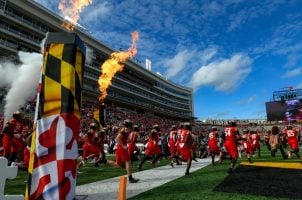Sports Bettors Comprise 1 in 5 US Adults, New Study Claims
Posted on: September 14, 2022, 04:49h.
Last updated on: September 16, 2022, 04:45h.
Nearly one in five US adults have wagered money on sports in the past year. That’s according to a report from Pew Research released Wednesday.

Pew Research surveyed 6,034 adults from July 5-17 and reported that 19% of US adults claimed to make a sports wager in the past year. The most popular way, reported by 15% of respondents, was wagering with friends or family in a casual bet, private betting pool, or fantasy league.
After that, 8% of respondents reported betting on sports in person at a casino, racetrack, or kiosk, and 6% reported doing so online. (Some respondents bet in multiple ways.) More than 80% of all legal sports bets in the US are made online.
The survey’s results indicate that the emergent US legal sports betting industry, while growing rapidly, still has much more room to expand.
Much More Room to Grow
Since the Supreme Court cleared the way for all 50 US states to legalize sports betting four years ago, Americans have wagered more than $125 billion on sports. As of last Thursday’s NFL season kickoff, sports betting was legal in 31 states plus Washington DC. Several other states will probably legalize it soon.
A record 46.6 million Americans plan to bet on the current NFL season, according to the American Gaming Association. That’s up 3% from last year.
Other Sports Betting Survey Results
- More male respondents (24%) than female (15%) reported sports betting.
- 22% of respondents under age 50 reported sports betting, compared to 17% over 50.
- 27% of Black respondents and 24% of Hispanic respondents reported sports betting, compared to 18% of white adults and 10% of Asian-Americans.
- Education was not a factor, with 18% of college grads reporting sports betting, compared to 20% of those without a college degree.
- Wealth was not a factor, either, with 22% of high-income households, 19% of middle-income households, and 19% of lower-income households reporting sports bets.
- Sports betting did not significantly vary by party affiliation, with 21% of Democrats and Democratic-leaning independents and 19% of Republicans and Republican-leaning independents reporting placing a sports bet in the past year.
- 57% of respondents said they thought sports betting was neither good nor bad for society, 34% thought it was bad, and 8% thought it was good.
- 49% of respondents said they thought sports betting was neither good nor bad for sports, 33% saw it as bad, and 16% saw it as good.
Related News Articles
Ohio Sportsbooks Generating Millions Before They Even Open
Most Popular
Mirage Las Vegas Demolition to Start Next Week, Atrium a Goner
Where All the Mirage Relics Will Go
Most Commented
-
Bally’s Facing Five Months of Daily Demolition for Chicago Casino
— June 18, 2024 — 12 Comments
















No comments yet